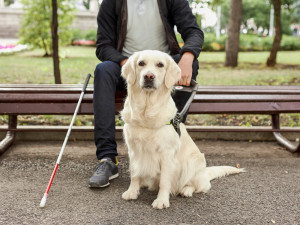Ghislaine Maxwell Barred from Service Dog Training Program in Prison
Some inmates wait years to participate.

Share Article
Last week, Ghislaine Maxwell, who was convicted of sex trafficking and sentenced to 20 years in prison, was moved to a minimum security prison camp in Texas. The new detention center is known as one of the best in the country,opens in new tab with dormitory-style housing, limited fencing, and a reputation for celebrity inmates — including current residents Elizabeth Holmes and Jen Shah.opens in new tab The space includes a variety of educational and cultural programs, from foreign language classes to sports practices to music lessons. But one offering is off limits to Maxwell: She won’t be allowed to participate in a service dog training program.
Canine Companions, an organization dedicated to raising and training service dogs, operates a “prison puppy raising” program in 25 detention centers around the United States. Incarcerated people apply for the program; if they’re selected as good fits for raising a dog, they receive a puppy who accompanies them throughout their daily activities. Dogs rotate from handler to handler each month, which allows inmates to get to know multiple dogs and work as part of a team with other participants. After the dogs graduate, they are placed in homes where they can support people living with disabilities.
But the program is considered a privilege, and admission isn’t guaranteed; according to Oregon Live,opens in new tab some people apply for years before they are accepted. Participants must be recommended by their correctional facility, pass a rigorous interview process and training observations, and maintain a clean disciplinary record. Due to the nature of her crime, Maxwell will not be able to participate.
“We do not allow anyone whose crime involves abuse towards minors or animals — including any crime of a sexual nature. That’s a hard policy we have, so she will not be able to,” Paige Mazzoni, the CEO of Canine Companions, told NBC News.opens in new tab “Those are crimes against the vulnerable, and you’re putting them with a puppy who is vulnerable.”
For those who are able to safely interact with dogs, the life-saving program makes a tangible impact on the futures of both pets and people. Incarcerated people who raise service dogs have lower than a 5 percent rate of recidivism, and puppies who are raised in prison programs graduate at a 10 percent higher rate than those raised in traditional homes, Canine Companions reports.opens in new tab
The emotional impacts are just as astounding. Some participants find that caring for a dog helps them feel less lonely; others see the program as an opportunity to give back and make amends. “We get letters from the incarcerated people saying things like, ‘It’s the first time I felt unconditional love,’ and, ‘It’s my chance to give back to society,’” Mazzoni told NBC News.opens in new tab “One of our board members loves to say, ‘If that dog doesn’t make it as a service dog, it’s still changed a life.’”

Sio Hornbuckle
Sio Hornbuckle is the Assistant Editor at Kinship, where they frequently write for the site. As a writer, they specialize in pet news, animal science, and pop culture. They live in New York City with their cat, Toni Collette.
Related articles
![Unrecognizable man sitting on a park bench with his service dog]()
What is the Difference Between Service Dogs and Therapy Dogs?
Both are perfect angels, to be clear.
What are the Training Requirements for Service Dogs?
Find out everything you need to know.
What’s an Emotional Support Animal? Your Guide to Support Animals and Dogs
Here’s everything you need to know about ESAs.
What are the Guidelines for Service Dogs in Public Places?
![]()
5 Places Where Therapy Dogs Do Their Best Work
At airports, hospitals, schools, and more, therapy dogs make things better.




